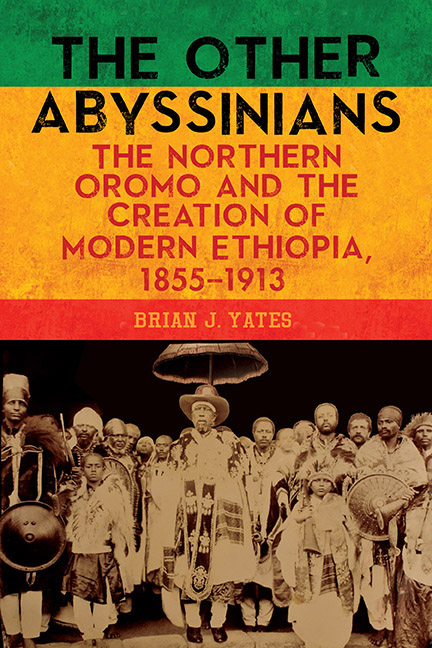Book contents
- Frontmatter
- Contents
- Preface
- Introduction: What about the Oromo Habäsha? Liberating Northern Oromo Experience from Competing Nationalisms
- 1 Cultural Backgrounds and the Habäsha State
- 2 In but not of: The (Re)Integration of the Wällo Oromo into the Habäsha Community
- 3 Menilek, Gobäna, and the Creation of Habäsha Shäwa, 1855–88
- 4 Recreating the Autonomy of Wällo: The Unions of Mikaél and Menilek
- 5 From Personal Relationships to a Centralizing State: Shäwan Ethiopia (1889–1913)
- Conclusion: The Oromo Habäsha in Modern Ethiopia
- Appendix A Guide to the Transliteration of the Ethiopic Script to the Latin Script
- Appendix B Glossary of Ethiopian Terms
- Appendix C Sample Interview Questions for Shäwa and Wällo
- Notes
- Bibliography
- Index
- Frontmatter
- Contents
- Preface
- Introduction: What about the Oromo Habäsha? Liberating Northern Oromo Experience from Competing Nationalisms
- 1 Cultural Backgrounds and the Habäsha State
- 2 In but not of: The (Re)Integration of the Wällo Oromo into the Habäsha Community
- 3 Menilek, Gobäna, and the Creation of Habäsha Shäwa, 1855–88
- 4 Recreating the Autonomy of Wällo: The Unions of Mikaél and Menilek
- 5 From Personal Relationships to a Centralizing State: Shäwan Ethiopia (1889–1913)
- Conclusion: The Oromo Habäsha in Modern Ethiopia
- Appendix A Guide to the Transliteration of the Ethiopic Script to the Latin Script
- Appendix B Glossary of Ethiopian Terms
- Appendix C Sample Interview Questions for Shäwa and Wällo
- Notes
- Bibliography
- Index
Summary
As we enter the second decade of the twenty-first century, scholars and politicians are looking to the past to find political aspects of current identities. Ethiopia is no exception; politicians and scholars have manipulated identities both within and outside of Ethiopia to advance a variety of political claims. In 2018, when Abiy Ahmed became prime minister of Ethiopia, many saw his Amhara, Oromo, Christian, and Muslim descent as a departure for Ethiopian leadership. This work argues that his ascent is completely in line with the nineteenth-century political culture of Ethiopia, where Oromo, Muslims, Christians, and “Amharas” shared power, beds, and battlefields and had been doing so for centuries. These experiences are not prevalent in the historiography of Ethiopia, especially in the twentieth and twenty-first centuries, but these are precisely the focus of this work. Writing this story includes a reconfiguration of Ethiopian identities, shifting away from exclusionary categories like race and ethnicity and toward categories like community, which are inclusionary and also more accurately describe the ways in which people have identified historically in Ethiopia. This framework also has applications both beyond Ethiopia and the African continent.
This work is also deeply personal. My parents are both black but very different culturally. My mother came from a Cape Verdean background and my father from a more traditional black American background, which proved not only that acculturation occurs due to marriage, but also that things that appear to be similar are sometimes, upon second look, vastly different. For Ethiopia, Abyssinians or Habäsha have been understood, especially by outsiders, as light skinned, Semitic, Christian, and non-African; on second look, however, this group also includes Muslims and Kushitic speakers like the Oromo; skin color plays no role in any of these groups and populations that are cognizant of their African identities. This approach has the potential to illuminate the nature of many pre-modern identities, as opposed to continuing to employ outside frameworks like race and ethnicity.
This work is a product of so many people who have helped me in profound ways. First, I would like to thank my mother, who was a constant source for my inquisitive mind, from teaching me to read, assigning me book reports, and doing what she could to protect me from American educational institutions.
- Type
- Chapter
- Information
- The Other AbyssiniansThe Northern Oromo and the Creation of Modern Ethiopia, 1855-1913, pp. vii - xPublisher: Boydell & BrewerPrint publication year: 2020



